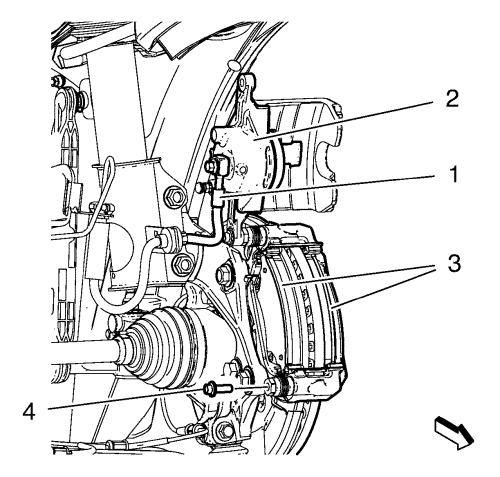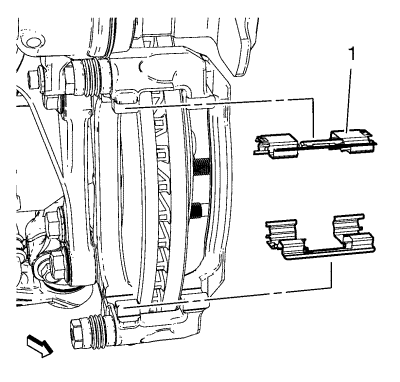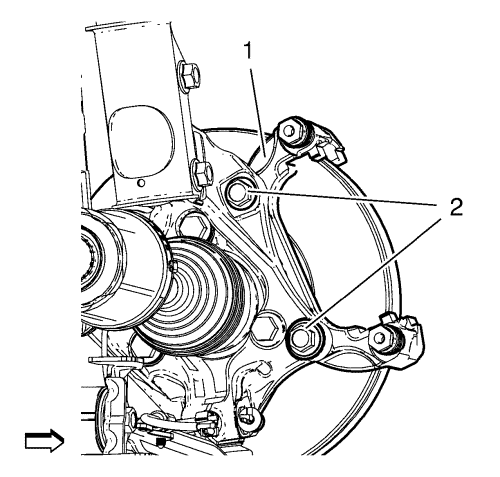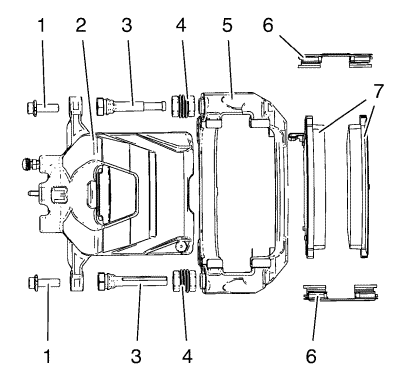Front Brake Calliper Bracket Replacement — 16 inch Brake System
Removal Procedure
Warning: Refer to Brake Dust Warning in the Preface section.
- Inspect the fluid level in the brake master cylinder reservoir.
- If the brake fluid level is midway between the maximum-full point and the minimum allowable level, no brake fluid needs to be removed from the reservoir before proceeding.
- If the brake fluid level is higher than midway between the maximum-full point and the minimum allowable level, remove brake fluid to the midway point before proceeding.
- Raise and support the vehicle. Refer to Lifting and Jacking the Vehicle .
- Remove the tyre and wheel assembly. Refer to Tyre and Wheel Removal and Installation .

- Remove the lower brake calliper guide pin bolt (4). Do NOT disconnect the hydraulic brake flexible hose (1) from the calliper (2).
Caution: Support the brake calliper with heavy mechanic wire, or equivalent, whenever it is separated from its mount and the hydraulic flexible brake hose is still connected. Failure to support the calliper in this manner will cause the flexible brake hose to bear the weight of the calliper, which may cause damage to the brake hose and in turn may cause a brake fluid leak.
- Without disconnecting the hydraulic brake flexible hose (1), pivot the calliper (2) upward and separate from calliper bracket in direction of arrow.
- Remove the brake pads (3).

- Remove the brake pad retainer springs (1).
- If reusing the bracket, thoroughly clean the pad hardware mating surfaces of the calliper bracket, of any debris and corrosion.
- Inspect the brake pad retainer springs (1) for the following:
| • | Looseness at the brake calliper mounting bracket |
| • | Looseness at the disc brake pads |
- If any of the conditions listed are found, the disc brake pad retainers require replacement.

- Remove and DISCARD calliper bracket bolts (2).
- Remove brake calliper bracket (1) from steering knuckle.

- Inspect the calliper bracket (5). If the brake calliper bracket (5) is bent, cracked, or damaged, it requires replacement.
- Inspect the brake calliper guide pins (3) for freedom of movement, and inspect the condition of the guide pin boots (4). Move the brake calliper guide pins (3) inboard and outboard within the brake calliper bracket (5), without disengaging the slides from the boots (4), and observe for the following:
| • | Restricted calliper guide pin movement |
| • | Looseness in the brake calliper mounting bracket |
| • | Seized or binding calliper guide pins |
- If any of the conditions listed are found, the brake calliper guide pins (3) and/or boots (4) require replacement.
Installation Procedure

- Install the brake calliper bracket (1) to the steering knuckle.
Warning: Refer to Torque-to-Yield Fastener Warning in the Preface section.
Caution: Refer to Fastener Caution in the Preface section.
- Install the NEW brake caliper bracket bolts (2) and tighten a first pass to 150 N·m (111 lb ft).
Warning: Refer to Torque-to-Yield Fastener Warning in the Preface section.
- Tighten the NEW brake caliper bracket bolts a final pass to an additional 45 to 60 degrees.

- Apply a very thin coating of high temperature silicone brake lubricant to the pad hardware mating surfaces of the calliper bracket only. Refer to Adhesives, Fluids, Lubricants, and Sealers for the recommended lubricant.
- Install the brake pad retainer springs (1).

Note: The wear sensor equipped disc brake pad must be mounted inboard of the rotor with the leading edge of the sensor facing the brake rotor during forward wheel rotation, or at the top of the pad when installed in vehicle position.
- Install the brake pad retainers (3) to the brake calliper bracket.
- Remove the support and reposition the brake calliper (2) over the brake pads and to the calliper bracket. Assure that guide pin bolts boots apply firmly.
- Install guide pin bolts and tighten to 28 N·m (21 lb ft).
- Install the tyre and wheel assembly. Refer to Tyre and Wheel Removal and Installation .
- Lower the vehicle.
- With the engine OFF, gradually apply the brake pedal approximately 2/3 of its travel distance.
- Slowly release the brake pedal.
- Wait 15 seconds, then gradually apply the brake pedal approximately 2/3 of its travel distance again until a firm brake pedal apply is obtained. This will properly seat the brake calliper pistons and brake pads.
- Fill the master cylinder auxiliary reservoir to the proper level. Refer to Master Cylinder Reservoir Filling .
| © Copyright Chevrolet. All rights reserved |






